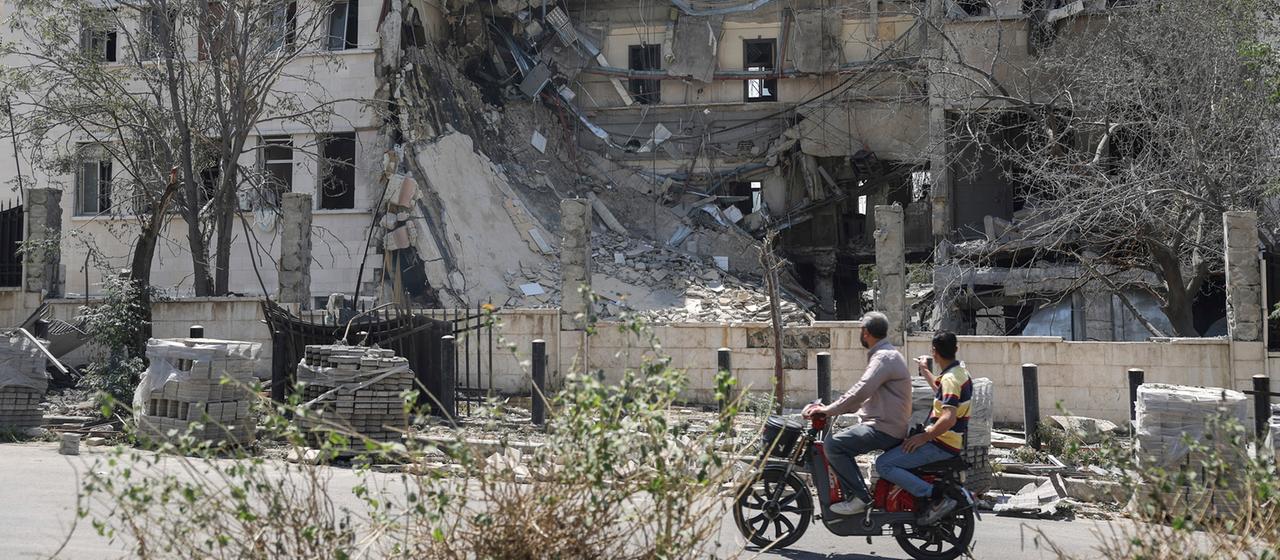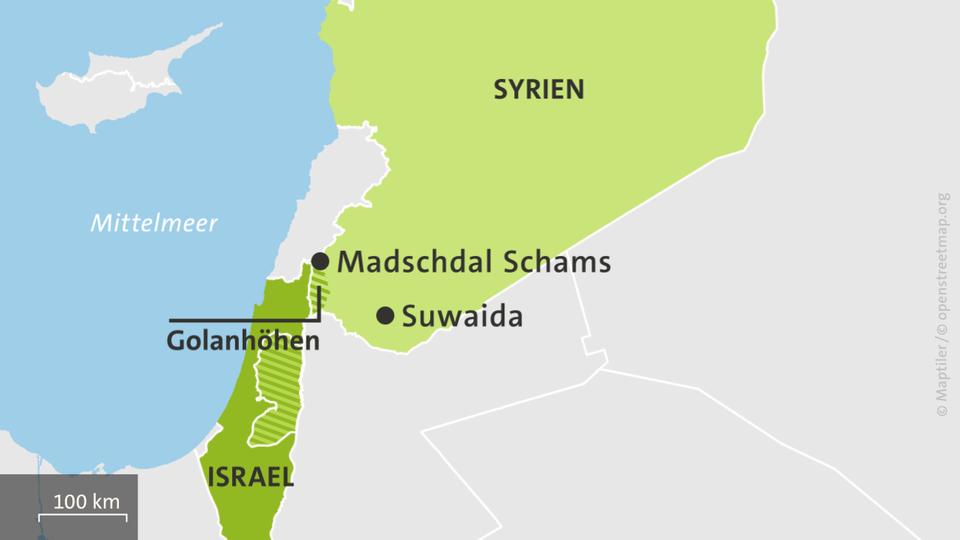
interview
Syria expert Bank discusses the ceasefire and Israel's interests in Syria in an interview. He believes Israel would prefer its neighboring country to remain weakened, but also warns of a new civil war.
tagesschau24 : The Syrian army and the Druze religious minority have apparently agreed to a ceasefire. How sustainable is this, in your opinion?
André Bank : There was already an initial attempt at a ceasefire on Tuesday, which collapsed very quickly. Now the chances that it will last are a bit higher. Everyone has seen how quickly the situation can escalate dramatically.
If the Druze side, the Syrian government, and Israel were to continue the fighting, it could quickly escalate into a civil war. I think everyone wants to prevent that.

To person
Dr. André Bank is a Senior Research Fellow at the GIGA Institute of Middle East Studies in Hamburg. His research focuses on the war in Syria, political governance, and regional order in the Middle East.
Pressure on al-Sharaa
tagesschau24 : Israel intervened in the conflict in its neighboring country. With what goal?
Bank : Officially, the Netanyahu government justified this by saying it wanted to protect the Syrian Druze. Druze live in Israel, Lebanon, Jordan, and also in the Israeli-annexed Golan Heights, which belong to Syria. That's the official justification.
In fact, however, Israel wants to completely control southern Syria. Netanyahu announced in March that the entire south of Syria, including the provinces of Daraa and Suwayda, would be a demilitarized zone, into which the Syrian army would not be allowed to enter – just as neither Iran nor Hezbollah, which played an important role there during Assad's reign, would be allowed to enter.
Third, it is certainly true that Israel wants to exert pressure on the Islamist government of interim President Ahmed al-Sharaa, essentially making reconstruction and sustainable political development in Syria impossible. Israel can live with this more easily if Syria remains divided and weakened.

"Not just one opinion within the Druze"
tagesschau24 : Let's take another look at all the parties involved in the conflict. How do the Druze and the Syrian military view each other?
Bank : Many Druze in Syria fear that their cultural and religious rights will be neglected under a unified state created by the new government. The same applies to Alawites, Christians, and Kurds—the fear of Sunni dominance.
In addition, there is more than one opinion within the Druze community. For example, Hikmat al-Hijri, one of the Druze spiritual leaders, is now appearing more frequently and is speaking out particularly loudly against the al-Sharaa government, demanding Israeli support.
Another Druze sheikh who played an important role in the recent negotiations opposes this Israeli role. So, the Druze position on this issue is very complex.
Added to this is the regional dimension. Israel is currently presenting itself as a supporter of the Druze. But there is also the well-known Lebanese Druze leader Walid Jumblatt, who was present and negotiated with the al-Sharaa government.
In short, there isn't just one Druze position. Rather, some demand integration into a federal Syrian system in which Druze have rights. Others demand a far-reaching rapprochement with Israel—I don't want to say secession, but rather rapprochement.
The relationships are instrumentalized
tagesschau24 : Why does Israel see itself as the protector of the Druze, and to what extent is this possibly a pretext to take action against the new Syrian government, the transitional government?
Bank : There is also a Druze community within Israel. Many of them live in the Golan Heights, which was annexed by Israel. From there, some crossed the border fence into Syria yesterday. Druze also serve in the military.
These connections undoubtedly exist. But they are also being exploited and used as a pretext to play certain groups off against each other in a kind of divide-and-rule strategy in Syria.
In my view, this is very problematic when it comes to rebuilding Syria and curbing the violence. This would be a prerequisite for real aid and investment to come to the country after the end of the US and EU sanctions.
At the same time, the Syrian government's actions are not without problems and must be condemned. The reports of the massive violence perpetrated against the civilian population in Suwayda must also be condemned.
So this isn't just about condemning one of the parties involved; rather, Germany and the EU, for example, should exert massive pressure on both sides: on the Syrian government and on Israel, to contain the violence.
Syrian army weakened
tagesschau24 : To what extent does Israel have a security interest in keeping the Syrian army at a distance from its own border?
Bank : Israel certainly has a security interest. However, there are absolutely no indications that the Syrian army, which is already massively weakened, would initiate any attacks against Israel.
It is rather surprising how a Sunni Islamist government, originally from the al-Qaeda spectrum, was so calm and so uncritical of Israel's actions towards Syria.
There may also be a development that protests like those we saw in Damascus are increasing pressure on al-Sharaa and his government to speak out more vocally against Israel.
But the Syrian army is on the ground. It's not about attacking Israel, but rather about taking control of its own country.
The transitional government under al-Sharaa controls only about two-thirds of the country. Israel is in the southwest, the Turkish army has occupied many areas of Syria in the north, and the Kurds occupy the northeast. The US military is also present there.
The Syrian government's security forces are currently focusing on how to maintain stability and order within the country. It's important that external pressure be applied, and that this isn't done in a brutal manner, as happened now with the Druze, as happened previously with the Alawites in March, or as in an earlier round of violence against the Druze in late April and early May.
Good relations in the region
tagesschau24 : Let's broaden our view to Syria's neighboring countries and the region. To what extent does Syria have allies in the Middle East?
Bank : The Syrian transitional government has allies, especially in Turkey, with whom it coordinates closely, which already played a major role in the takeover of power from Assad.
It also maintains good relations with the Gulf states. In May, the summit took place in Riyadh, where al-Sharaa met with US President Donald Trump, also mediated by the Saudis.
The Qataris and the Emiratis play an important role. They, too, would be willing to invest in the future if the situation in Syria improves. Likewise, there are good neighborly relations with Jordan, although the Jordanians maintain a closed border.
The Druze currently have no escape route to Jordan. Al-Sharaa is in contact with many countries in the region for purely pragmatic reasons, simply because of the current weakness of his government.

